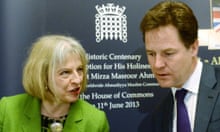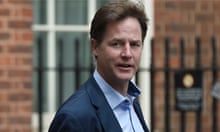Theresa May has accused the Liberal Democrats of “outrageous irresponsibility” for “torpedoing” the so-called snooper’s charter communications data bill and vowed that a Conservative government will introduce it.
The Lib Dems responded by revealing that they had blocked the immediate implementation of the home secretary’s new proposals to ban extremists from the web and the airwaves because she had provided no evidence that they would be effective or were necessary.
The home secretary, in a chilling speech in which she highlighted the scale of the threat to Britain from Islamic State (Isis), stressed the need to “defeat the ideology that lies behind the threat”.
May confirmed she would introduce a counter-terrorism bill in November which would confiscate the passports of Britons who travel to fight in Syria and Iraq and to strengthen terrorism prevention and investigation measures.
But she reserved her strongest assault for her coalition partners, the Lib Dems, for blocking the communications data bill two years ago which would have given the police and security services the power to track Britons’ email and internet use.
She said that bill had been introduced because of the “crisis in national security” created by the rapidly declining ability of the police and security services to monitor internet and phone use. The decline had led to the National Crime Agency dropping at least 20 cases because of missing communications data, including 13 “threat-to-life cases” in which children were at risk.
May said the Lib Dems had been “outrageously irresponsible” for torpedoing the legislation because innocent people were in danger without it. “If we do not act, we risk sleepwalking into a society in which crime can no longer [be] investigated and terrorists can plot their murderous schemes undisrupted,” she said.
Just before May’s speech, the Lib Dems issued a damning statement condemning her plans to ban non-violent extremists. “Theresa May has failed to provide any evidence that banning orders are necessary or would prove effective at tackling radicalisation and extremism. There are already a range of powers to deal with incitement to violence and racial hatred,” a spokesman said.
The Lib Dems also strongly rejected May’s claim that their opposition to the “snooper’s charter” was putting lives at risk, pointing out that the police already had access to communications data in such cases and that they had backed work on matching internet addresses that would help in the children-at-risk cases she had cited.
One Lib Dem MP, Julian Huppert, immediately responded to the attack: “Proud to be criticised by Theresa May for blocking the comms data bill/snooper’s charter. Job well done!”
The row between the coalition partners over surveillance and extremism came instead of an expected battle over human rights. The justice secretary, Chris Grayling, said the promised plan on how they would tackle their approach to the European court of human rights would be announced “shortly but not today”.
May confirmed her plan to tackle non-violent extremists: “I want to see new banning orders for extremist groups that fall short of the existing laws relating to terrorism. I want to see new civil powers to target extremists who stay within the law but still spread poisonous hatred. So both policies ‚ banning orders and extremism disruption orders ‚ will be in the next Conservative manifesto,” she said.
A Tory briefing note made clear that the banning orders, which can include denying access to the airwaves and to the net, would be targeted not just at so-called hate preachers but also those who sought to “disrupt the democratic process” and “undermine democracy”.
May said the banning orders were part of a widening of the government’s counter-terrorism strategy, saying in the past preventive measures had focused only on the “hard end of the extremism spectrum. So the Home Office will soon, for the first time, assume responsibility for a new counter-extremism strategy that goes beyond terrorism.”
She said the measures would be overseen by the Home Office and would aim to eliminate all forms of extremism‚ including neo-Nazism and Islamist extremism. In particular, it would confront the “culture of bullying and intimidation” found in schools in Birmingham: “We must not sleepwalk into separation, segregation and sectarianism,” she said.
In her speech, May said Muslims in the UK were free to exercise their right to freedom of conscience, thought and religion but must realise that living in the country came with a responsibility to respect British values. She said: “You don’t just get the freedom to live how you choose to live, you have to respect other people’s right to do so too and you have to respect British values and institutions – the rule of law, democracy, equality, free speech and respect for minorities. These are the values that make our country what it is. These are our values. There is no place for extremism here.”
She said that although extremists were dangerous, they remained a small minority. “We know the overwhelming majority of British people want to be free – free from danger, free from fear, free from prejudice, free from discrimination, free to practise their religion, free to observe their cultures and traditions, free to dress as they like, free to be educated as they choose, free to work where they wish, free to live with whom they love, free to raise their families as they see fit, free to get on with their lives,” May said.
“We must not become a society where these things are no longer possible. We must confront segregation and sectarianism. We must face down extremism in all its forms. We must stand up for our values. Because in the end, as they have done before, those values – our British values, will win the day and we will prevail.”



Comments (…)
Sign in or create your Guardian account to join the discussion